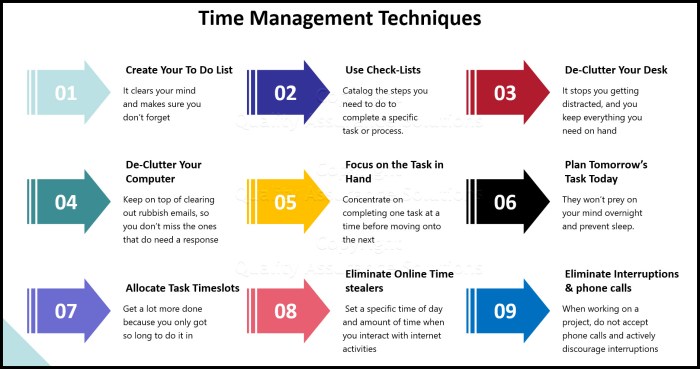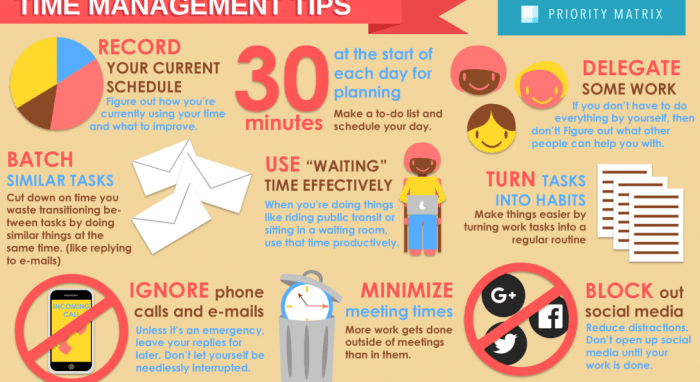Time Management Tips: Are you tired of feeling overwhelmed and stressed out by your daily tasks? Dive into our guide to discover strategies for boosting productivity, setting realistic goals, and overcoming procrastination.
Learn how effective time management can transform your personal and professional life, leading to a more organized and stress-free lifestyle.
Importance of Time Management

Effective time management is crucial for boosting productivity in both personal and professional life. By efficiently allocating time to tasks, individuals can accomplish more in less time, leading to increased efficiency and success.
Benefits of Effective Time Management
- Improved productivity: Proper time management allows individuals to focus on important tasks and complete them efficiently.
- Reduced stress levels: By prioritizing tasks and allocating time appropriately, individuals can avoid the last-minute rush and reduce stress.
- Enhanced work-life balance: Effective time management helps individuals allocate time for work, family, and personal activities, leading to a more balanced lifestyle.
- Increased motivation: Accomplishing tasks in a timely manner boosts confidence and motivation, leading to a positive outlook on work and life.
Impact of Poor Time Management
- Missed deadlines: Poor time management can result in missed deadlines, leading to negative consequences in both personal and professional settings.
- Increased stress: Procrastination and poor time allocation often lead to increased stress levels as individuals struggle to complete tasks on time.
- Decreased quality of work: Rushing through tasks due to poor time management can result in a decrease in the quality of work produced.
Correlation between Time Management and Stress Levels
Effective time management plays a significant role in reducing stress levels. By planning and organizing tasks efficiently, individuals can avoid the overwhelming feeling of being behind schedule. This, in turn, leads to reduced stress and a more relaxed approach to daily tasks.
Strategies for Effective Time Management: Time Management Tips
Effective time management is crucial for productivity and success. By utilizing different techniques and strategies, individuals can maximize their efficiency and achieve their goals. Here are some key strategies for effective time management:
Different Techniques for Prioritizing Tasks
- Use the Eisenhower Matrix to categorize tasks into urgent, important, non-urgent, and non-important.
- Consider the ABCDE method, where tasks are ranked in order of priority from A (most important) to E (least important).
- Utilize the Pareto Principle (80/20 rule) to focus on tasks that will yield the most significant results.
Share Tips for Setting Realistic Goals and Deadlines
- Set SMART goals that are Specific, Measurable, Achievable, Relevant, and Time-bound.
- Break down larger goals into smaller, manageable tasks to track progress effectively.
- Establish deadlines for each task to create a sense of urgency and accountability.
Discuss the Importance of Creating a Daily Schedule or To-Do List
- Plan your day ahead by creating a detailed schedule or to-do list to stay organized and focused.
- Prioritize tasks based on deadlines, importance, and urgency to allocate time efficiently.
- Review and adjust your schedule regularly to adapt to changing priorities and unforeseen circumstances.
Explain the Concept of the Pomodoro Technique and Its Effectiveness
- The Pomodoro Technique involves working in short, focused intervals (typically 25 minutes) followed by a short break.
- By breaking work into manageable chunks, individuals can maintain high levels of concentration and productivity.
- Use a timer to track work periods and breaks, ensuring a balance between focused work and rest for optimal performance.
Overcoming Procrastination
Procrastination is a common challenge that many people face, often leading to missed deadlines and increased stress. It can stem from various reasons such as fear of failure, lack of motivation, or feeling overwhelmed by the task at hand. Overcoming procrastination requires self-discipline and effective strategies to stay focused and productive.
Identify Common Reasons for Procrastination
- Fear of failure or perfectionism: Some individuals procrastinate because they are afraid of not meeting their own high standards.
- Lack of motivation: A lack of interest or enthusiasm for the task can lead to procrastination.
- Feeling overwhelmed: When a task seems daunting or too complex, it can be tempting to put it off.
Strategies for Overcoming Procrastination, Time Management Tips
- Break tasks into smaller steps: Divide tasks into manageable parts to make them less overwhelming and easier to tackle.
- Set specific goals and deadlines: Establish clear objectives and timelines to create a sense of urgency and accountability.
- Avoid distractions: Identify and eliminate distractions that may hinder your focus and productivity.
The Role of Self-Discipline
- Self-discipline plays a crucial role in combating procrastination by helping individuals stay committed to their goals and priorities.
- Developing self-discipline involves building habits, setting routines, and holding oneself accountable for their actions.
Tips for Breaking Tasks into Smaller, Manageable Steps
- Start with a clear plan: Artikel each step of the task to create a roadmap for completion.
- Focus on one step at a time: Avoid getting overwhelmed by concentrating on completing one part of the task before moving on to the next.
- Celebrate small victories: Acknowledge and reward yourself for each completed step to stay motivated and on track.
Time Management Tools and Apps

In today’s fast-paced world, time management tools and apps have become essential for staying organized and productive. These tools can help individuals prioritize tasks, set deadlines, and track progress efficiently.
Popular Time Management Tools
- Trello: Trello is a popular project management tool that uses boards, lists, and cards to organize tasks and collaborate with team members. It allows users to create task lists, set due dates, and assign tasks to team members.
- Asana: Asana is another widely used project management tool that helps teams track their work and manage projects effectively. It offers features such as task assignments, due dates, and progress tracking to streamline workflows.
- Todoist: Todoist is a simple yet powerful task management app that allows users to create to-do lists, set reminders, and prioritize tasks. It also offers integration with other apps and platforms for seamless task management.
Comparison of Features
- Trello: Known for its visual approach with boards and cards, ideal for visual learners and team collaboration.
- Asana: Offers a comprehensive set of project management features, suitable for larger teams and complex projects.
- Todoist: Focuses on simplicity and ease of use, perfect for individuals or small teams looking for a straightforward task management solution.
Benefits of Using Time Management Apps
- Increased productivity: Time management apps help users stay organized, prioritize tasks, and focus on what matters most, leading to improved productivity.
- Efficient task tracking: These apps allow users to track their tasks, set reminders, and monitor progress, ensuring that deadlines are met and goals are achieved.
- Collaboration and teamwork: Tools like Trello and Asana enable teams to collaborate effectively, share tasks, and communicate seamlessly, enhancing overall productivity and project success.